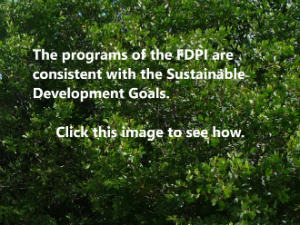Statement presented at the 4th International Conference on Small Island Developing States Antigua and Barbuda, May 29, 2024 Civil society represents an untapped potential in the effort to achieve just and sustainable development in small island developing states. That potential is not reflected in the text of the Antigua and Barbuda Agenda for SIDS but can be realized through the […]
The Foundation for Development Planning, Inc. (FDPI) routinely engages with other organizations and the general public in various ways, ranging from information sharing to supporting the work of other organizations to participation in networks. That engagement is guided by a public engagement strategy. The FDPI understands engagement as a mutually beneficial process and therefore encourages individuals and organizations to become […]
In a 1994 speech on effective public administration for local government systems, the late Professor Edwin Jones shared what he considered to be the role of public administration in building “… macro organizational capacities, to ensure co-operation among organizations and to steer such organizations toward effective problem-solving via collective decision making.” He suggested that the actions of public administration “… […]
By Lloyd Gardner First published as an Op-ed in the Virgin Islands Source on March 2, 2012 An October 2011 Associated Press article on climate change stated that a leading skeptic of climate change, after conducting his own study, concluded that the earth’s surface temperature is rising. This was notable because this particular climate skeptic, Richard Muller, is said to […]
By Lloyd Gardner March 1, 2012 Environmental impact assessment (EIA) can be defined simply as a mechanism for identifying the likely environmental impacts of an action. Within the Caribbean, EIA is used in two basic ways; (i) as an evaluation tool for identifying the environmental impacts of specific projects, and (ii) as a process for facilitating public participation in […]
By Lloyd Gardner January 1, 2012 Green spaces were traditionally included in urban development to achieve objectives such as aesthetics (verges and gardens), provision of recreational opportunities (gardens, camp grounds, playing fields, urban parks), and delineation of particular land uses (e.g. green belts used to demarcate residential areas or set city limits). Green spaces contribute to an urban community’s […]
By Lloyd Gardner December 1, 2011 One of the supporting elements of environment and development programmes is the establishment of communication and information sharing mechanisms. Such mechanisms have evolved to include professional networks and the use of internet-based communication tools. During the 1980s and 1990s, the establishment of national environmental management agencies, the rapid growth in the number of […]
By Lloyd Gardner November 1, 2011 The Caribbean community is reminded constantly that the tourism industry produces significant economic benefits to Caribbean economies. Less discussed, but of major concern, are the environmental and social costs associated with Caribbean tourism development. Though there have been previous attempts to identify the environmental impacts associated with tourism in the Caribbean, the costs […]
